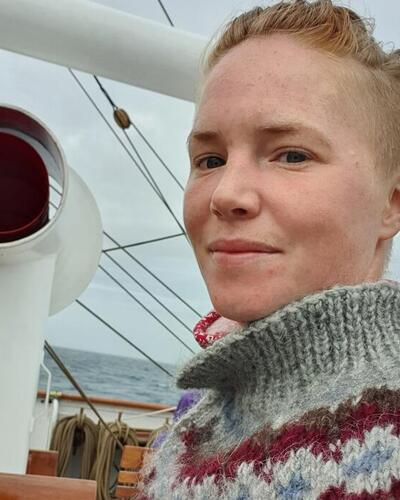- E-mailmeike.becker@uib.no
- Visitor AddressAllégaten 705007 Bergen
- Postal AddressPostboks 78035020 Bergen
I am a researcher with a focus on chemical oceanography at the Geophysical Institute/University of Bergen in Norway. I focus understanding what governs the uptake of carbon by the worlds oceans, especially the North Atlantic and the Nordic Seas. I am especially interested in the interactions between the upper ocean carbon cycle and the biological cabon pump.
Academic article
- (2024). An assessment of CO2 storage and sea-air fluxes for the Atlantic Ocean and Mediterranean Sea between 1985 and 2018. Global Biogeochemical Cycles.
- (2023). The consolidated European synthesis of CO2 emissions and removals for the European Union and United Kingdom: 1990–2020. Earth System Science Data. 4295-4370.
- (2023). Rapid fCO2 rise in the northern Barents Sea and Nansen Basin. Progress in Oceanography. 25 pages.
- (2022). Global Carbon Budget 2021. Earth System Science Data. 1917-2005.
- (2021). The northern European shelf as an increasing net sink for CO2. Biogeosciences.
- (2021). In-air one-point calibration of oxygen optodes in underway systems. Limnology and Oceanography : Methods. 292-302.
- (2020). Long-term intercomparison of two pCO2 instruments based on ship-of-opportunity measurements in a dynamic shelf sea environment . Limnology and Oceanography : Methods. 1-14.
- (2019). Wintertime fCO2 variability in the subpolar North Atlantic since 2004 . Geophysical Research Letters. 1580-1590.
- (2019). Winter weather controls net influx of atmospheric CO2 on the north-west European shelf. Scientific Reports. 1-11.
- (2019). Trends of Ocean Acidification and pCO2 in the Northern North Sea, 2003-2015. Journal of Geophysical Research (JGR): Biogeosciences.
- (2019). Global carbon budget 2019. Earth System Science Data. 1783-1838.
- (2018). A Detailed View on the Seasonality of Stable Carbon Isotopes Across the North Atlantic. Global Biogeochemical Cycles. 1406-1419.
Report
- (2023). The One Ocean Expedition: Science and Sailing for the Ocean We Want. 2023 - 34. 2023 - 34. .
- (2022). Monitoring ocean acidification in Norwegian seas in 2021 - selected results. .
Lecture
- (2023). Havforsuringsprogrammet.
- (2018). ICOS data used for Ocean acidification research.
- (2018). CO2 metrology - present situation for the marine community.
Popular scientific lecture
- (2022). Havets rolle i det globale karbonbudsjett.
Academic lecture
- (2023). Rapid fCO2 rise in the northern Barents Sea and Nansen Basin.
- (2023). An assessment of CO2 storage and sea-air fluxes of the Atlantic Ocean and Mediterranean Sea between 1985 and 2018.
- (2022). Estimating air sea CO2 flux on the European shelf .
- (2021). The northern European shelf as increasing net sink for CO2 .
- (2021). Anthropogenic CO2 emissions and climate change: the state of art and future scenarios .
- (2017). The Anthropocene in the marine carbon isotope record, δ13C in the Nordic Seas.
- (2017). Surface ocean pCO2 measurements within ICOS Norway and the example of M/V Nuka Arctica.
- (2017). Nuka Arctica: North Atlantic Observatory.
Database
- (2017). pCO2 Measurements on the Voluntary Observing Ship M/V Nuka Arctica 2017.
Feature article
- (2021). Hvordan skal vi følge med på CO2 utslippene? Klassekampen.
Programme management
- (2023). Meike Becker og Ingunn Skjevlan - Deepwater acidification.
Poster
- (2017). Surface ocean pCO2 maps along the Norwegian coast-A regional optimization of global pCO2 maps.
- (2017). Impact of North Atlantic freshening on sea surface fCO2.
Academic literature review
- (2019). Constraining the oceanic uptake and fluxes of greenhouse gases by building an ocean network of certified stations: The ocean component of the Integrated Carbon Observation System, ICOS-Oceans. Frontiers in Marine Science. 1-15.
More information in national current research information system (CRIStin)
- ICOS - Integrated Carbon Observation Systems: Meike Becker is PI for the ships of opportunity (SOOP) Tukuma Arctica (from 2020) and Nuka Arctica (until 2020). This work includes setting up and improving the instrumentation, maintenance, data reduction and quality control.
- Co-chair of the Ocean MSA (Montitoring Station assembly) of ICOS
- Verify: Becker is Co-investigator and responsible for mapping coastal air-sea fluxes of CO2 in Europe
- One Ocean Expedition: PI for the surface ocean pCO2 measurements onboard.
- The Nansen Legacy: Becker is Co-investigator and works on determining the air-sea flux of CO2 in the Barents Sea
- Havforsuringsprogrammet (Ocean acidification program) of the Norweagian Environmental Agency
I have experience with the following observations/intrumentations in the lab and at sea:
- surface ocean pCO2 monitoring from commercial ships
- dissolved oxygen observations
- stable carbon isotopes (13C-DIC)
- alkalinity and DIC analysis
- transient tracer analysis
- POC/PON and Chl a analysis
Fields of competence
